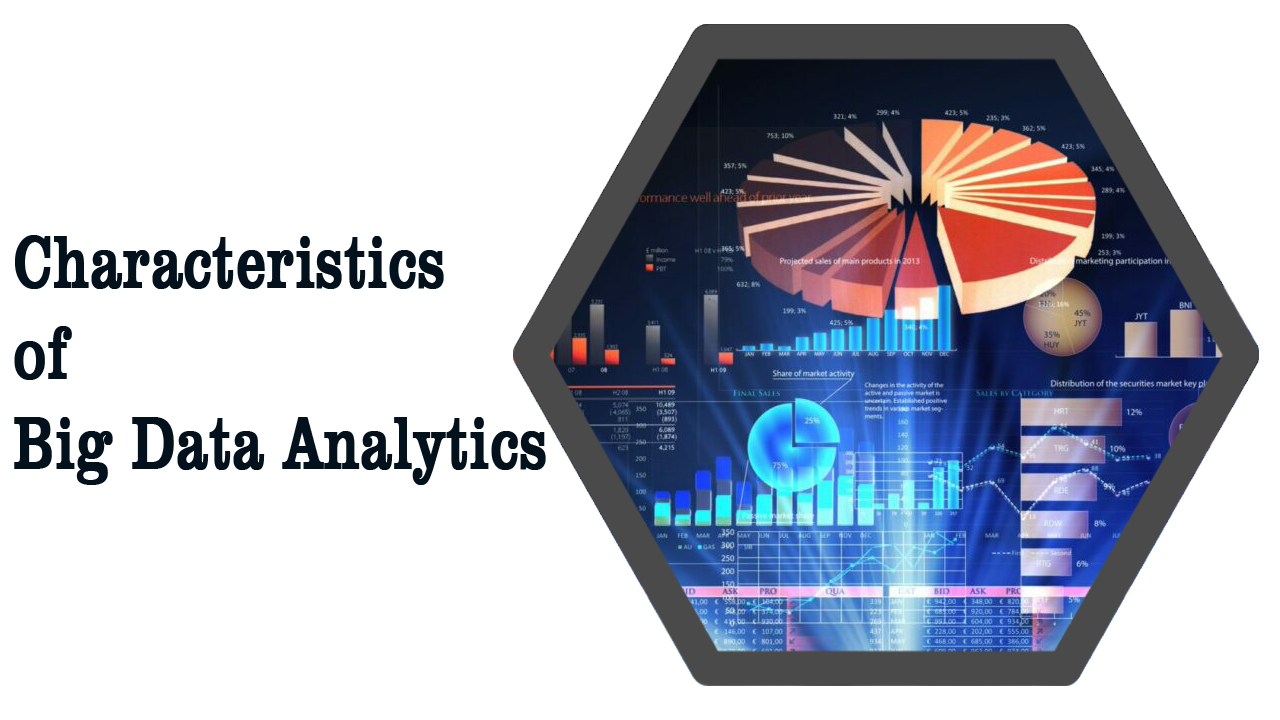Introduction Characteristics of Big Data Analytics
Big Data Analytics is a process of extracting meaningful insights and patterns from large and complex data sets. It involves the use of advanced tools and techniques to analyze massive amounts of data and extract insights that can be used for decision-making. In this article, we will explore the key characteristics of Big Data Analytics. 
Characteristics of Big Data Analytics
1. Volume The first characteristic of Big Data Analytics is the sheer volume of data that is being analyzed. Big Data Analytics involves processing large data sets that are too big to be managed by traditional data processing tools.
2. Variety The second characteristic of Big Data Analytics is the variety of data types that are being analyzed. Big Data Analytics involves analyzing data from different sources, such as social media, sensors, and other sources, which can be in different formats.
3. Velocity The third characteristic of Big Data Analytics is the velocity at which data is generated and processed. Big Data Analytics involves analyzing data in real-time or near real-time, which requires high-speed processing capabilities. 4. Veracity The fourth characteristic of Big Data Analytics is the veracity or accuracy of the data being analyzed. Big Data Analytics involves analyzing data that may be incomplete, inconsistent, or inaccurate, which requires
sophisticated tools and techniques to clean and refine the data. 5. Complexity The fifth characteristic of Big Data Analytics is the complexity of the data being analyzed. Big Data Analytics involves analyzing data that may be structured, semi-structured, or unstructured, which requires advanced tools and techniques to extract insights from the data. 6. Value The
final characteristic of Big Data Analytics is the value that can be derived from the data. Big Data Analytics involves analyzing data to extract insights that can be used for decision-making, which can lead to improved business outcomes, such as increased revenue or reduced costs.
Advantages of Big Data Analytics
Big Data Analytics provides several advantages to organizations, including: 1. Improved decision-making: Big Data Analytics enables organizations to make data-driven decisions by providing insights into customer behavior, market trends, and other important factors. 2. Cost
savings: Big Data Analytics can help organizations identify cost-saving opportunities by optimizing their operations and reducing waste. 3. Improved customer experience: Big Data Analytics can help organizations better understand their customers and provide them with a better experience, leading to increased customer loyalty and revenue. 4. Competitive
advantage: Big Data Analytics can provide organizations with a competitive advantage by enabling them to make more informed decisions and optimize their operations, leading to greater success. 5. Predictive analytics: Big Data Analytics enables organizations to use predictive analytics to forecast future trends and identify potential opportunities and risks.
Challenges of Big Data Analytics
While Big Data Analytics provides several advantages, it also presents some challenges, including: 1. Data quality: Big Data Analytics projects rely on high-quality data. However, the quality of data can be compromised due to various factors, such as data entry errors,
inconsistent data formats, and data duplication. 2. Scalability: Big Data Analytics projects require significant computing resources to process large amounts of data. Organizations need to ensure that their infrastructure can handle the workload generated by Big Data Analytics
projects. 3. Skilled professionals: Big Data Analytics projects require skilled professionals with expertise in data science, machine learning, and programming. However, there is a shortage of skilled professionals in this field, making it difficult for organizations to find and hire the right talent.
Conclusion Characteristics of Big Data Analytics
Big Data Analytics is a powerful tool for organizations looking to gain insights from their data and make data-driven decisions. It involves analyzing large and complex data sets using advanced tools and techniques. The key characteristics of Big Data Analytics are volume, variety, velocity, veracity, complexity, and value. While Big
Challenges of Big Data Analytics
Big data analytics offers immense potential for organizations to gain valuable insights and drive strategic decisions. However, harnessing the power of big data is not without its challenges. The complexity and scale of big data present several hurdles that organizations must navigate to fully realize the benefits of their data initiatives. This article explores the key challenges of big data analytics and offers insights into how organizations can address them.
1. Data Quality and Integration
Overview: Ensuring the quality and consistency of data is one of the foremost challenges in big data analytics. Inconsistent, incomplete, or inaccurate data can undermine the reliability of analytical outcomes.
Key Challenges:
- Data Accuracy: Inaccurate or outdated data can lead to erroneous insights and misguided decisions.
- Data Integration: Combining data from disparate sources (e.g., structured, semi-structured, and unstructured data) into a unified view can be complex and resource-intensive.
Solutions:
- Data Cleaning: Implement robust data cleaning processes to address inaccuracies and inconsistencies.
- Data Integration Tools: Use advanced data integration and ETL (extract, transform, load) tools to harmonize data from various sources.
2. Data Privacy and Security
Overview: As organizations collect and analyze large volumes of data, ensuring data privacy and security becomes increasingly critical. Protecting sensitive information from breaches and unauthorized access is a major concern.
Key Challenges:
- Compliance: Adhering to data protection regulations (e.g., GDPR, CCPA) requires stringent measures to safeguard personal data.
- Cybersecurity Threats: Large datasets are attractive targets for cyberattacks, necessitating robust security protocols.
Solutions:
- Encryption: Implement data encryption techniques to protect data at rest and in transit.
- Access Controls: Use strict access controls and authentication mechanisms to restrict data access to authorized personnel only.
3. Scalability and Performance
Overview: As the volume of data grows, maintaining the performance and scalability of big data systems becomes a significant challenge. Organizations must ensure their infrastructure can handle increasing data loads and processing requirements.
Key Challenges:
- Infrastructure Requirements: Scaling infrastructure to accommodate growing data volumes requires substantial investment in hardware and software.
- Processing Speed: Ensuring timely data processing and analysis can be difficult as datasets become larger and more complex.
Solutions:
- Cloud Solutions: Leverage cloud-based solutions that offer scalable storage and computing resources.
- Distributed Computing: Use distributed computing frameworks (e.g., Hadoop, Spark) to process data across multiple nodes efficiently.
4. Data Management and Governance
Overview: Effective data management and governance are essential for ensuring data integrity, consistency, and usability across the organization.
Key Challenges:
- Data Governance: Establishing clear policies and procedures for data management, quality, and stewardship can be challenging.
- Metadata Management: Managing metadata (data about data) is crucial for understanding data lineage and ensuring proper use.
Solutions:
- Data Governance Framework: Develop and implement a comprehensive data governance framework with defined roles, responsibilities, and policies.
- Metadata Tools: Utilize metadata management tools to track and manage data assets effectively.
5. Talent and Skill Shortages
Overview: The demand for skilled data professionals often exceeds supply, making it challenging for organizations to find and retain talent with expertise in big data analytics.
Key Challenges:
- Skill Gaps: Finding professionals with the necessary skills in data science, machine learning, and big data technologies can be difficult.
- Training and Development: Providing ongoing training to keep staff updated with the latest technologies and methodologies is essential.
Solutions:
- Upskilling Programs: Invest in upskilling and reskilling programs for existing employees to develop their big data analytics capabilities.
- Partnerships: Collaborate with educational institutions and training providers to address talent shortages and build a pipeline of skilled professionals.
6. Data Complexity
Overview: The complexity of big data, including its volume, variety, and velocity, can pose significant challenges for analysis and interpretation.
Key Challenges:
- Data Variety: Handling diverse data types (e.g., text, images, videos) requires specialized tools and techniques.
- Data Velocity: Processing and analyzing data in real-time or near-real-time can be complex and resource-intensive.
Solutions:
- Advanced Analytics Tools: Use advanced analytics and data processing tools that can handle diverse data types and high data velocities.
- Real-Time Analytics: Implement real-time analytics platforms to process and analyze streaming data effectively.
7. Cost and Resource Management
Overview: Managing the costs associated with big data analytics projects, including infrastructure, tools, and human resources, can be challenging.
Key Challenges:
- Cost Overruns: The expense of setting up and maintaining big data infrastructure can exceed initial budgets.
- Resource Allocation: Allocating sufficient resources for data storage, processing, and analysis requires careful planning.
Solutions:
- Cost Management: Implement cost management strategies, such as cloud cost optimization and budgeting for data projects.
- Resource Planning: Develop a resource allocation plan that aligns with project goals and anticipated data needs.
8. Ethical Considerations
Overview: The ethical implications of using big data, including issues related to data ownership, consent, and the potential for misuse, must be carefully considered.
Key Challenges:
- Ethical Use: Ensuring that data is used responsibly and ethically, particularly in sensitive areas like health and personal finance.
- Bias and Fairness: Addressing potential biases in data and algorithms to prevent unfair treatment or discrimination.
Solutions:
- Ethical Guidelines: Develop and adhere to ethical guidelines and best practices for data collection, usage, and analysis.
- Bias Mitigation: Implement strategies to identify and mitigate biases in data and algorithms to ensure fair and equitable outcomes.
9. Integration with Existing Systems
Overview: Integrating big data analytics solutions with existing systems and processes can be complex and require significant adjustments.
Key Challenges:
- Compatibility: Ensuring compatibility between new big data tools and existing IT infrastructure can be challenging.
- Change Management: Managing the transition and adoption of new technologies while minimizing disruptions to existing workflows.
Solutions:
- Integration Planning: Develop a comprehensive integration plan that outlines how new tools will fit into existing systems.
- Change Management: Implement change management practices to support a smooth transition and adoption of big data technologies.
10. Managing Data Lifecycle
Overview: Effectively managing the entire lifecycle of data, from acquisition and storage to archiving and deletion, is essential for maintaining data quality and compliance.
Key Challenges:
- Data Retention: Determining how long to retain different types of data and managing data retention policies.
- Data Deletion: Ensuring secure and compliant deletion of data that is no longer needed.
Solutions:
- Lifecycle Management Policies: Develop data lifecycle management policies that define how data should be handled at each stage of its lifecycle.
- Automated Tools: Use automated data management tools to streamline data retention, archiving, and deletion processes.
Conclusion
While big data analytics offers transformative benefits, it also presents a range of challenges that organizations must address to fully leverage its potential. From data quality and privacy concerns to scalability and ethical considerations, navigating these challenges requires a strategic approach, the right tools, and a commitment to best practices. By proactively addressing these challenges, organizations can harness the power of big data analytics to drive innovation, enhance decision-making, and achieve long-term success in a data-driven world.
